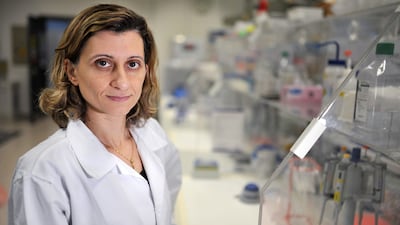DUBAI // Lack of collaboration between universities, domestically and internationally, remains a major barrier to the UAE’s progress in academic and scientific research.
Dr Fatme Al Anouti, associate professor of chemistry at Zayed University, said that collaboration was crucial in science-based research for many reasons, not least saving time and money and, in the UAE, because of a shortage of dedicated researchers.
In addition, collaboration at an international level gives more validity to research and brings more recognition to the country and researchers.
There were barriers to overcome, Dr Al Anouti said. “Many scientists here have a different image of collaboration because they think of it as some kind of a competition and are often hesitant to collaborate with others. This needs to change.”
Many projects depend on collaboration, especially lab-based experimental science, which is much more long term than the likes of social science research.
Dr Al Anouti, who has been working for two years with geneticist Dr Habiba Al Safar, at Khalifa University, investigating diabetes and vitamin D deficiency, said: “Results might take one or two years to be verified, sometimes even more, and this is why communicating with other researchers to share data and feedback is so important, because it will shorten the time needed to complete the study.
“Collaboration will also save money because it will compensate for a lack, or shortage of, equipment or even research assistants. In addition, with several efforts being consolidated, the research will gain momentum.”
The president of Khalifa University, Prof Tod Laursen, said his institution had collaborations in the likes of nuclear engineering and semiconductor research. “Both in starting up the nuclear engineering programme, and now as we expand our research, collaborations with international partners have been important,” he said.
“Sometimes it is because we are seeking countries or universities who have research reactors, which the UAE doesn’t at this time. Sometimes, particularly when we were still building our own labs, we took teams of graduate students to locations for things we couldn’t provide.”
With resources “thin” at most UAE institutions, Prof Laursen said incentivising collaboration was “absolutely vital”.
“I think as a policy matter the Government could think about making research resources available in a manner that specifically targets groups of institutions or researchers collaborating on problems of national interest,” he said. “Influential science or technological development just can’t be done in isolation, at least in a scalable way. Technologies move so fast that economies and researchers need to be up to date on the most recent developments.”
Mr Leland Blank, dean of engineering at the American University of Sharjah, agreed and said the major barrier to collaboration was the lack of a centralised research fund.
“It [collaboration] would happen much more often were there a national research fund that promoted the exchange in science, engineering, the arts and design that the UAE does not have at this time,” he said. “This a well-known deficiency in the UAE that must be faced in the near future.”
Some efforts to collaborate have not been successful. The University Leadership Council, which was set up six years ago between leading institutions such as UAE University, American University of Sharjah and Khalifa University, aimed to bridge such gaps, pushing for collaboration but, for the past two years, it has been defunct.
Heriot-Watt University’s Dubai campus is one of several institutions in Dubai coming together to form a research steering committee.
“Universities should get together to explore opportunities for sharing expensive resources, which would automatically encourage research collaboration,” said Prof Ammar Kaka, the campus director. This is very much what we in HWU are looking to do.”
mswan@thenational.ae

